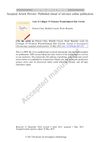collagen
🛒 Where to find collagen
Tracking 3 topical products and 2 oral products by companies like Amazon, Dr.FORHAIR, Manual, ZeeMoreUncle and oxfordon line pharmacy. View all 5 products »Research
20 / 1000+ resultsresearch A Novel Marker of Tissue Junctions, Collagen XXII
Collagen XXII is a marker for tissue junctions, aiding in structural integrity and found in muscles, heart, skin, and arthritic joints.
research Role of Macrophages in Collagen Resorption During Hair Growth Cycle
Macrophages help break down collagen around hair follicles during hair growth.

research Ontogenetic Transition in Fetal Wound Transforming Growth Factor-Beta Regulation Correlates with Collagen Organization
Fetal wound healing changes with development, affecting inflammation and collagen, which may influence scarring.
research Life Before and Beyond Blistering: The Role of Collagen XVII in Epidermal Physiology
Collagen XVII is vital for skin structure, hair stem cell support, and skin cell regulation.
research The 800-nm Diode Laser Irradiation Induces Skin Collagen Synthesis by Stimulating TGF-β/Smad Signaling Pathway
The 800-nm laser boosts skin collagen production, improving skin structure.
research Growth Factors Specifically Alter Hair Follicle Cell Proliferation and Collagenolytic Activity Alone or in Combination
Growth factors can either promote or inhibit hair follicle cell growth and collagen breakdown.
research Epithelial Differentiation of Human Adipose-Derived Stem Cells Undergoing Three-Dimensional Cultivation with Collagen Sponge Scaffold via an Indirect Co-Culture Strategy
Using a collagen sponge scaffold helps stem cells become more like skin cells.
research Collagen and Fractionated Platelet-Rich Plasma Scaffold for Dermal Regeneration
The hydrogel with fractionated PRP improves skin regeneration by enhancing wound healing and growth of skin structures.
research Basement Membrane Zone Remodeling During Appendageal Development in Human Fetal Skin: The Absence of Type VII Collagen Is Associated with Gelatinase-A (MMP2) Activity
Type VII collagen absence helps skin development by allowing tissue remodeling.

research Minoxidil Exerts Different Inhibitory Effects on Gene Expression of Lysyl Hydroxylase 1, 2, and 3: Implications for Collagen Cross-Linking and Treatment of Fibrosis
Minoxidil affects collagen-related genes, potentially helping treat fibrosis.
research Co-Culture of Human Hair Follicles and Dermal Papillae in a Collagen Matrix
Dermal papillae enhance hair follicle growth and structure.
research Effect of Hyaluronic Acid and Poly-L-Lactic Acid Dermal Fillers on Collagen Synthesis: An In Vitro and In Vivo Study
Hyaluronic acid increases collagen synthesis safely, while poly-L-lactic acid may cause complications by affecting fibroblasts.

research Lack of Collagen VI Promotes Wound-Induced Hair Growth
Mice without collagen VI have slower hair growth normally but faster regrowth after injury.
research Collagen/Chitosan Gels Cross-Linked with Genipin for Wound Healing in Mice with Induced Diabetes
The gels improved wound healing in diabetic mice but need human trials.
research Proliferation and Differentiation of Organoid Hair Follicle Cells Co-Cultured with Fat Cells in Collagen Gel Matrix Culture
Fat cells slow hair cell growth but speed up their development.

research Epidermal Stem Cells Cultured on Collagen-Modified Chitin Membrane Induce In Situ Tissue Regeneration of Full-Thickness Skin Defects in Mice
Epidermal stem cells on a special membrane helped mice regrow full skin with hair and functions.
research Collagen-Type Synthesis in Human Hair Papilla Cells in Culture
research Collagenase IV Plays an Important Role in Regulating Hair Cycle by Inducing VEGF, IGF-1, and TGF-Beta Expression
Collagenase IV is crucial for hair growth by affecting key growth factors.
research Collagenase IV Plays an Important Role in Regulating Hair Cycle by Inducing VEGF, IGF-1, and TGF-β Expression.
Collagenase IV helps control hair growth by affecting certain growth factors.
research Treatment for Chemotherapy-Induced Alopecia in Mice Using Parathyroid Hormone Agonists and Antagonists Linked to a Collagen Binding Domain
PTH-CBD agonists may help regrow hair after chemotherapy.